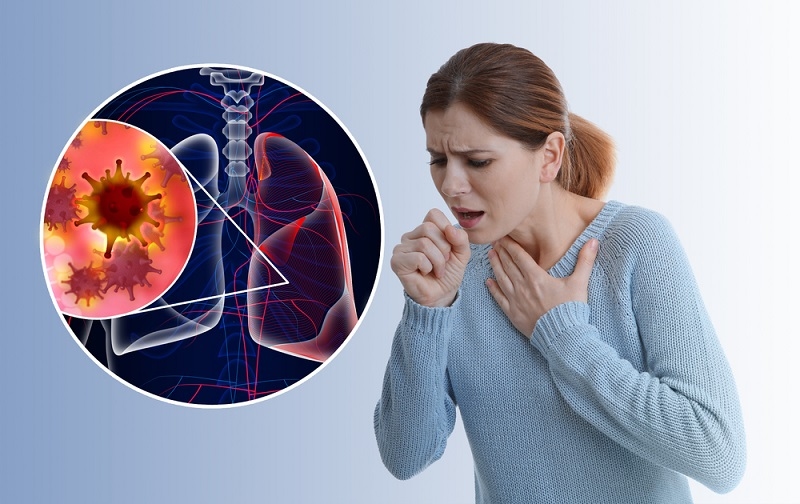Understand and Manage Pneumonia for a Healthy & Easy Breath

In a world where respiratory health has become more critical than ever, it's crucial to be aware of conditions that can affect our breathing. Pneumonia, a common respiratory infection, can cause significant discomfort and even be life-threatening if left untreated. This blog aims to provide a comprehensive understanding of pneumonia, including its causes, symptoms, treatments, and prevention strategies.
What is Pneumonia?
Pneumonia is an infection that inflames the air sacs in one or both lungs, causing them to fill with fluid or pus. This leads to symptoms such as cough, difficulty breathing, chest pain, and fever. It can be caused by various pathogens, including bacteria, viruses, fungi, or even chemical irritants.
Causes and Risk Factors of Pneumonia
Inhalation of Infected Droplets:
Pneumonia can be acquired by inhaling droplets contaminated with infectious agents. These droplets may be released into the air when an infected individual coughs, sneezes, or talks. Breathing in these infected droplets can lead to the development of pneumonia.
Aspiration of Bacteria into the Lungs:
Aspiration pneumonia occurs when bacteria from the mouth, throat, or stomach are inhaled into the lungs. This can happen when someone accidentally inhales food, drink, saliva, or vomit. Individuals with difficulty swallowing, impaired consciousness, or weakened gag reflex are at a higher risk of aspiration pneumonia.
Bloodstream Infections Spreading to the Lungs:
Sometimes, infections in other parts of the body can spread through the bloodstream and reach the lungs, leading to pneumonia. Bacteria, viruses, or fungi that circulate in the bloodstream can settle in the lung tissues and cause an infection.
Common Risk Factors for Pneumonia
Age:
Both young children and older adults have a higher vulnerability to pneumonia. Children's immune systems are still developing, making them more susceptible to infections. Older adults may have weakened immune systems, making it harder for their bodies to fight off infections effectively.
Weakened Immune System:
A weakened immune system compromises the body's ability to defend against infections, including pneumonia. Conditions that can weaken the immune system include HIV/AIDS, cancer, organ transplantation, and certain autoimmune diseases. Medications such as immunosuppressants and corticosteroids can also suppress immune function.
Chronic Lung Diseases:
Individuals with pre-existing lung conditions, such as chronic obstructive pulmonary disease (COPD), asthma, bronchiectasis, or cystic fibrosis, have damaged or weakened lungs. This makes it easier for bacteria or viruses to cause an infection and develop into pneumonia.
Smoking:

Smoking damages the respiratory system impairs lung function, and weakens the body's natural defense mechanisms. Smokers are more susceptible to respiratory infections, including pneumonia. Secondhand smoke exposure also increases the risk.
Recent Respiratory Infections:
Having a recent respiratory infection, such as a cold, flu, or bronchitis, can weaken the respiratory system and make it more susceptible to a secondary infection, such as pneumonia. These infections can cause inflammation and damage to the respiratory tract, creating an opportunity for pneumonia-causing pathogens to invade.
Understanding the causes and risk factors of pneumonia is essential for prevention and early intervention. By addressing these factors and taking appropriate measures, individuals can reduce their risk of developing pneumonia and maintain optimal respiratory health.
Recognizing the Symptoms

Pneumonia symptoms can range from mild to severe, depending on the individual and the causative agent. Common signs include persistent cough, chest pain, shortness of breath, fever, chills, fatigue, and confusion in older adults. If you experience any of these symptoms, it is crucial to seek medical attention promptly.
Diagnosis and Treatment
A healthcare professional will conduct a thorough evaluation, including a physical examination, medical history review, and possibly diagnostic tests such as chest X-ray, blood tests, or sputum culture. Treatment depends on the type and severity of pneumonia but typically includes antibiotics, antiviral medications, cough medicines, and fever reducers. Hospitalization may be required for severe cases.
Prevention Strategies
Prevention plays a vital role in reducing the risk of pneumonia. Vaccination is crucial, particularly for individuals at higher risk, such as young children, older adults, and those with chronic conditions. Practicing good hygiene, including regular handwashing, covering your mouth when coughing or sneezing, and avoiding close contact with sick individuals, can also help prevent the spread of infection.
Managing Pneumonia at Home
For individuals with mild pneumonia who can manage the condition at home, it is essential to rest, stay hydrated, and take prescribed medications as directed. Use a humidifier or inhale steam to ease breathing and relieve chest congestion. However, it is crucial to monitor symptoms closely and seek medical attention if they worsen.
The Importance of Follow-Up Care
Once diagnosed with pneumonia, it's essential to complete the entire course of prescribed medications, even if symptoms improve. Follow-up appointments with healthcare providers help ensure the infection is completely resolved and monitor for any potential complications.
Conclusion
Pneumonia is a significant respiratory infection that requires prompt attention and appropriate management. By understanding its causes, recognizing symptoms, adopting preventive measures, and seeking proper treatment, we can breathe easily and reduce the impact of this common yet potentially serious condition. Remember, your respiratory health matters, so take care and stay informed!
This content was created by AI
